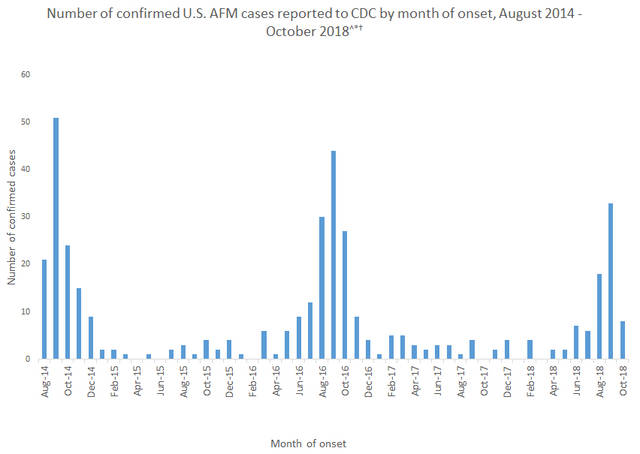KAILUA-KONA — The number of cases of acute flaccid myelitis doubled from last month, however, Hawaii has yet to confirm a cause of the polio-like illness, state health officials said Wednesday.
Eighty cases of acute flaccid myelitis, or AFM, have been confirmed in 25 states through Nov. 2, according to the Centers for Disease Control and Prevention, according to the Centers for Disease Control and Prevention. At the end of September, the CDC reported 38 cases had been confirmed in 16 states.
Anna Koethe, public health information coordinator for the state Department of Health, said Wednesday that a case has yet to be confirmed this year in the state.
The CDC cautioned that the 80 confirmed cases are among 219 reports that the CDC received of patients under investigation with onset of symptoms in August, September and October as of Nov. 2.
“CDC and state and local health departments are still investigating some of these PUIs,” CDC officials said in their Nov. 5 update. “With enhanced efforts working with local and state health departments and hospitals, we were able to gather information on PUIs and confirm a number of these cases faster. CDC is now providing the number of patients still under investigation so people can better anticipate increases in confirmed cases over the coming months.”
The CDC has been monitoring and investigating an increasing number of cases of AFM since 2014. From August 2014 to October, 404 cases had been confirmed, most frequently among children. Hawaii has had no verified reports during that time period.
Acute flaccid myelitis is a rare condition that affects a person’s nervous system, specifically the spinal cord, according to the CDC. A virus, a genetic disorder, and environmental toxins can cause it.
Symptoms, health officials say, can be similar to those associated with poliovirus and West Nile and include facial and eyelid drooping, facial weakness, difficulty moving the eyes, difficulty swallowing, slurred speech, sudden limb weakness and loss of muscle tone and reflexes in the arms or legs. Poliovirus and West Nile virus may sometimes lead to AFM.
There is no specific treatment for AFM, but a neurologist, a doctor who specializes in treating brain and spinal cord illnesses, may recommend interventions on a case-by-case basis.




Keyword is ENVIRONMENTAL TOXINS. Stop spraying roundup on our roads and the people sitting by them would be a smart start!